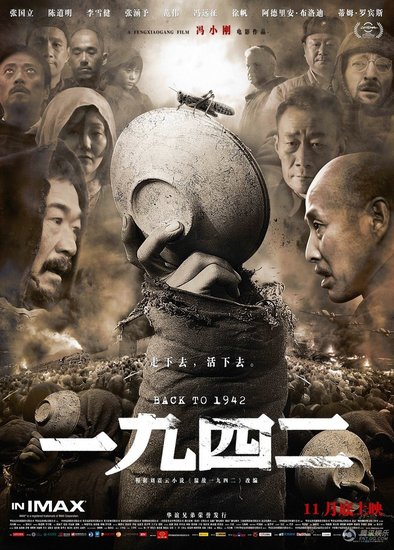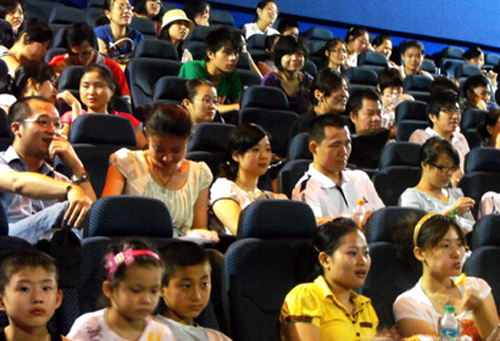Distributors to theaters: Raise our shares!
- By Zhang Rui
 0 Comment(s)
0 Comment(s) Print
Print E-mail China.org.cn, November 15, 2012
E-mail China.org.cn, November 15, 2012

The new season for China's film industry hasn't started yet, but Chinese film distributors have already sent an ultimatum to theaters, requesting a raise in their profit shares, China.org.cn has learned.
China Film Group Corporation, the state-owned giant, Huayi Brothers Media Group, the biggest private entertainment empire, as well as Bona Film Group, Stellar Mega Films Ltd., and Enlight Pictures Co., Ltd. have joined forces in a battle against theater chains to enhance their companies' interests.
The demands of the five giants are simple: To raise their box office profit shares from 43 percent to 45 percent. If theaters concede, nine year-end blockbusters, including Feng Xiaogang's "1942" and Jackie Chan's "CZ12," and other future releases will follow this newly proposed profit share model.
The new film season will take off on Nov. 29 when China Film Group and Huayi releases blockbuster "Back to 1942" on the same day going head-to-head with Lu Chuan's epic "The Last Supper." Bona is set to release "The Grand Masters" by Wong Kar-Wai as well as "The Last Tycoon" by Wong Jing. More films are bound to follow later.
In a notice issued to theater chains, all five film distributors said that China's home-made blockbusters have contributed significantly to the nation's film market. Yet they complained that as they continue to produce films using state-of-the-art technology and a lot of manpower, production costs will continue to rise. Therefore all five giants stated, "In order to boost the creation and production of so-called home-made movies, improve their quality and gradually smooth over the economic relationships between the stages of producing, distributing and screening, we five companies have reached the consensus that the profit share proportion for distributors should not be lower than 45 percent - against the theaters' 55 percent."
The distributors then gave nine titles of films which will be affected by the new measure and expressed their hopes for theaters to support their decision so that they can and will produce better films.

The profit share stands for the net revenue distribution after taxes. The previously normal ratio was set at 43: 57. During the 2011 season, Zhang Yimou's former partner Zhang Weiping fought eight major Chinese theater chains to raise profit shares from 43 percent to 45 percent for "The Flowers of War." The dispute was settled after Chinese Film Bureau officials intervened. When a film company has an ace in one hand, they will play the card.
This year, five major distributors fought back and formed a coalition. "They are the Avengers (as in the American comic book characters)," industry insiders will jokingly say, "They are fighting against the Justice League," -- a.k.a. the theater chains. The fact that the notice should be taken as an order, not an opening bid stunned many theater managers.
When China.org.cn approached him about the above mentioned issue, Liang Liang, a veteran Wanda Cinema salesman said, "I have only three words: Go to hell!"
Zhu Yuqin, chief editor of the Zongyi Weekly's movie section, a state publication on variety media, said in her tweets that the first negotiations may take place tomorrow. Several theater chain giants will convene next Wednesday to further work out this matter.
"This is like brothers killing each other," Zhu said, "China's film industry already has a frail base and the burden for cinemas is heavy. Theaters now have to hand over 3 percent of the gross revenues in taxes, and 5 percent to China's government film fund, and then give another 43 percent to film distributors and studios. And expenses don't stop here. 20 percent goes to the theater's annual renting fee and 15 percent serves as an operating fee, so how is a theater supposed to make money in the end? "
"A multiplex cinema with 1,500 seats will have to gross 25 million yuan a year in order not to lose any money. In China, less than 20 percent of all cinemas are able to achieve this."
But other Chinese media outlets reported that it was actually the Chinese authorities who requested a profit share raise when the central government announced they would help boost China's home-made film production. After learning today's news, many moviegoers fear that theaters may raise ticket prices to compensate for the losses they will suffer after the change in profit shares sets in.







Go to Forum >>0 Comment(s)